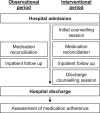Improving Patient's Primary Medication Adherence: The Value of Pharmaceutical Counseling
- PMID: 26469927
- PMCID: PMC4616785
- DOI: 10.1097/MD.0000000000001805
Improving Patient's Primary Medication Adherence: The Value of Pharmaceutical Counseling
Abstract
Quality of transitions of care is one of the first concerns in patient safety. Redesigning the discharge process to incorporate clinical pharmacy activities could reduce the incidence of postdischarge adverse events by improving medication adherence. The present study investigated the value of pharmacist counseling sessions on primary medication adherence after hospital discharge.This study was conducted in a 1844-bed hospital in France. It was divided in an observational period and an interventional period of 3 months each. In both periods, ward-based clinical pharmacists performed medication reconciliation and inpatient follow-up. In interventional period, initial counseling and discharge counseling sessions were added to pharmaceutical care. The primary medication adherence was assessed by calling community pharmacists 7 days after patient discharge.We compared the measure of adherence between the patients from the observational period (n = 201) and the interventional period (n = 193). The rate of patients who were adherent increased from 51.0% to 66.7% between both periods (P < 0.01). When discharge counseling was performed (n = 78), this rate rose to 79.7% (P < 0.001). The multivariate regression performed on data from both periods showed that age of at least 78 years old, and 3 or less new medications on discharge order were predictive factors of adherence. New medications ordered at discharge represented 42.0% (n = 1018/2426) of all medications on discharge order. The rate of unfilled new medications decreased from 50.2% in the observational period to 32.5% in the interventional period (P < 10). However, patients included in the observational period were not significantly more often readmitted or visited the emergency department than the patients who experienced discharge counseling during the interventional period (45.3% vs. 46.2%; P = 0.89).This study highlights that discharge counseling sessions are essential to improve outpatients' primary medication adherence. We identified predictive factors of primary nonadherence in order to target the most eligible patients for discharge counseling sessions. Moreover, implementation of discharge counseling could be facilitated by using Health Information Technology to adapt human resources and select patients at risk of nonadherence.
Conflict of interest statement
The authors have no conflicts of interest to disclose.
Figures
References
-
- LaPointe NM, Jollis JG. Medication errors in hospitalized cardiovascular patients. Arch Intern Med 2003; 163:1461–1466. - PubMed
-
- Abbasinazari M, Hajhossein Talasaz A, Eshraghi A, et al. Detection and management of medication errors in internal wards of a teaching hospital by clinical pharmacists. Acta Med Iran 2013; 51:482–486. - PubMed
-
- Geurts MM, van der Flier M, de Vries-Bots AM, et al. Medication reconciliation to solve discrepancies in discharge documents after discharge from the hospital. Int J Clin Pharm 2013; 35:600–607. - PubMed
-
- Kuo GM, Touchette DR, Marinac JS. Drug errors and related interventions reported by United States clinical pharmacists: the American College of Clinical Pharmacy practice-based research network medication error detection, amelioration and prevention study. Pharmacotherapy 2013; 33:253–265. - PubMed
-
- Paulino EI, Bouvy ML, Gastelurrutia MA, et al. Drug related problems identified by European community pharmacists in patients discharged from hospital. Pharm World Sci 2004; 26:353–360. - PubMed
MeSH terms
LinkOut - more resources
Full Text Sources
Medical



